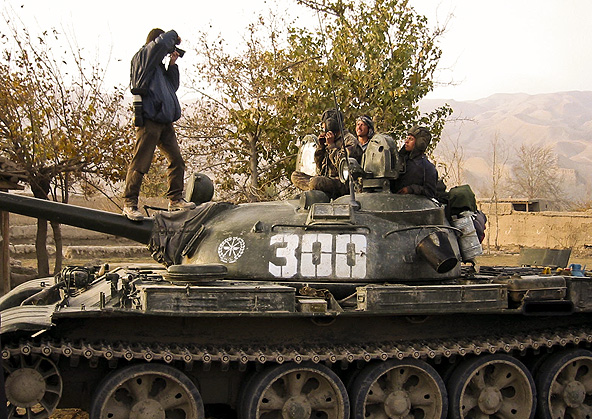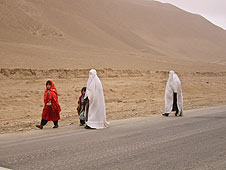
19 November, 2001, Bangi Pol, Afghanistan. Sion Touhig photographs Northern Alliance fighters in a soviet tank.
Photo: Phillip Robertson
At noon, in a deep V-shaped channel, dug so that the road could pass through a hill, we arrived at the spot where the Taliban commanders would bring their men and vehicles. Several hundred mujahedin covered the hillsides, waiting with their guns on the ground. In a few minutes, a new-looking Chevy Suburban with tinted windows drove down the road and an emissary from the Taliban side got out to greet Mullah Taj Muhammad, a Northern Alliance commander. They hugged and kissed, stroking their beards. The emissary drove back to the Taliban side. Soon after he left, with his last assurance of safety for the men who were about to give themselves up, there was a convoy of vehicles coming down the rutted track, carrying hundreds of Talibs wearing black turbans, who were packed like sardines into trucks, vans, and tanks.
We waited for the fighting to start. A single shot fired would have been enough. One Taliban fighter who went by in the back of a pickup, held a tripod mounted machine gun he pointed at the mujahedin on the nearby hillsides. We could see his finger on the trigger, and he was very nervous, thinking that he would be betrayed at the last minute.
The mujahedin on the hills were watching the spectacle like baseball fans, and cheered every time a new tank or pickup came through. I was struck by how new the Taliban pickups looked. Many of them were less than a year old and in great condition, not at all like the rusty, battered hulks the Northern Alliance used to get around.
Somebody had been buying the Taliban expensive vehicles, and for Taj Muhammad, the commander who would get to keep the best of the lot, it was Christmas. Kunduz had to fall in the next 24 hours, we thought. There was no way the Taliban could hold it more than another day.
By four in the afternoon on Sunday, a massive column of at least nine tanks and what seemed like acres of jeeps and pickups had assembled on the main Taloqan- Kunduz road, just west of Bangi. Thousands of fighters were arrayed in a line that was at least a mile long. The air smelled of diesel fumes and smoke and there was constant noise and shouting. Fighters took their weapons off safety, in a chorus of metallic clicks. People ran around like mad, the mujahedin jockeying for position in the column, commanders yelling at their fighters to stay in their groups, but our plan was simple. Sion, Amin, our interpreter Nazar and myself would join the column and ride with it to Khanabad, possibly all the way to Kunduz. "Khanabad, Kunduz, finished," the fighters said. We believed them. In fact, an hour earlier, we were treated to a press conference at Choga given by Gen. Daoud Khan, who said in no uncertain terms to the world media, "Our forces are now entering Kunduz."
As we were waiting for the word to start off down the road, a friend who works for the Washington Post came up to me in a panic. "I just hate these situations and I keep thinking of my kids," she said. "Going with the column could be a really stupid idea." Her voice shook. She wanted to know if she could use my satellite phone if she was separated from her driver and translator. I told her I thought that we wouldn't have a problem, that the Taliban had probably fled west toward Kunduz, away from the Northern Alliance column. To help us identify her car, she cut a strip from her scarf and tied it to one of the side mirrors.
Another 30 minutes passed with no movement, and then suddenly, the column started to roar off without us. We let most of it go past, thinking that if there was going to be a nasty firefight, it wasn't smart to be the first ones to get it. The key was to travel somewhere in the middle, closer to the end, but not be dead last.
I asked Amin to start driving and instead of pulling out, he went on and on in Dari with Nazar offering a condensed, and probably more polite, translation. "Phillip, it is very dangerous. We should not go." We told Amin and Nazar that they were wasting precious time, that it was getting dark, and we had to get a move on before we were stranded without any Northern Alliance forces on the road with us. The negotiations between Sion and I, and Nazar and Amin, dragged on for crucial minutes while the column disappeared toward Khanabad. When Amin put the jeep in gear and drove off down the road into the gloom and the dust, we were greeted by a scene of increasing weirdness. Just past the recently abandoned Taliban front line, across from Choge Nawabad, we found a 50-foot B-52 bomb crater planted squarely in the middle of the road, next to a completely demolished building. Amin managed to get the jeep around the lip of the crater and we kept going toward Khanabad, where we were presented with an unexpected choice. It was a fork in the road.
Sion said, "Nazar, which is the correct way to Khanabad?"
"What?"
"We have a choice, which is the right direction?" Sion was furious.
"I don't understand," Nazar whined.
Two cars full of journalists were following us. Any mistake we made would be theirs as well. Amin picked a direction and kept going. In a minute, we were all in Khanabad, which was completely deserted except for a few villagers who came out to talk to us. I asked them when the Taliban had left Khanabad, and the villagers said they had left an hour ago. My friend from the Washington Post turned her car around and drove back to Bangi.
The light failed us then. The plan was to go another kilometer to find the others, and we ultimately got there by begging Amin to go forward in increments of 200 meters. At a place called Ludin, we found a group of mujahedin waiting for orders to proceed. Amin stopped the car, and Sion asked why we were stopping. "Because we have to figure out what's going on."
 LEAD IMAGE: 20 November 2001. Refugees on the road before the fall of Kunduz to the Northern Alliance.
LEAD IMAGE: 20 November 2001. Refugees on the road before the fall of Kunduz to the Northern Alliance.Photo: Phillip Robertson
© Phillip Robertson, 2009-2014.
